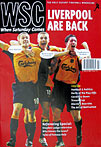 With the promise of being the most football-friendly government, Martin Cloake investigates the manifesto which helped New Labour come to power in 1997
With the promise of being the most football-friendly government, Martin Cloake investigates the manifesto which helped New Labour come to power in 1997
Promising to be the most football-friendly government ever helped Labour get elected in 1997. This time, football has been much lower on the agenda of every party, where it appears at all. Yet the election had barely started before all mention of it was knocked off many front pages by the news that a football manager would probably be leaving his club in 12 months’ time.
I managed to drag myself away from the travails of Alex Ferguson to trawl through the manifestos. What rapidly became clear was that no one has much to offer at all. Labour say they are “working in partnership with the FA and Premier League to plough money into grassroots football” but – rather characteristically – doesn’t say how much or by when. If they win, Labour promise they will make £750 million available to invest in first-class school sports facilities.
It’s only fair to mention the Co-operative Party, which is affiliated to Labour, at this point. It has been the driving force behind the new mutualism idea at the heart of Supporters Direct, the body established by the government to help fans take a stake in their club.
The Conservatives, under the slogan “Time For Common Sense” say nothing, which may have been the most sensible option, while the Liberal Democrats see the route to “Freedom, Justice and Honesty” running via Community Sports Plans and developing school sports. Superbly vague.
The Greens and Scottish and Welsh Nationalists remain utterly silent on football, as does the Socialist Labour Party. The Socialist Alliance has a policy which commits it to tackling pricing structures in all forms of entertainment, so that “working people aren’t priced out”. This does rather prompt the observation that it’s only already only pretty well paid working people who can afford to attend at many grounds, but the sentiment is clear even if the detail is not. There is no musing on Bosman from the UK Independence Party, or indeed anything else to do with football.
It’s all very different from 1997, and that’s not such a bad thing. While it was encouraging that Labour promised limited intervention in football, I remember feeling slightly embarrassed as a fan that my leisure pursuit appeared to have been elevated to the status of a great affair of state. Issues like health, education, transport, industry, the environment and social policy were, and still are, much more important than football – a point I will argue strongly unless I happen to be at the match. The parties know this and, realising there is no significant football vote to rival the fabled tribes of Mondeo men and Middle Englanders, aren’t exercising themselves unduly to court it.
There’s another point too. Football is run by private interests, largely unaccountable corporate bodies whose primary objective is to make as much money as possible. As such, it fits in perfectly with Labour’s economic vision. The things that are wrong with football – concentration of wealth, lack of accountability, greed and sharp practice among them – are not confined to the game. A government which tackled these issues on a wider level would see the change filter through to football.
From WSC 173 July 2001. What was happening this month